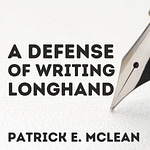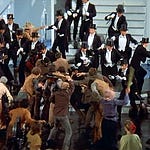It can seem like we’re a whole lot less civil than we used to be. I think this may be an illusion foisted on us by bitter election cycles and the “objects in mirror are more hysterical than they appear” effects of social media.
Here’s a thing worth remembering if you think American Politics has become uncivil — right before the civil war Preston Brooks, a Representative from South Carolina, beat Senator Charles Sumner bloody on the floor of the Senate with his cane. The beating was so bad, it took Sumner three years to recover.
So, if you’re worked up by some remark on Twitter, you could re-calibrate how serious you think such things really are.
Or maybe not. Because it’s not that we face a choice between manners and savagery, it that’s in a cultural and evolutionary sense, violence produces manners. They are very tightly linked. A lot of manners and etiquette are stylized violence.
Why Handshakes?
Take, for example, a handshake. I mean, why should that evolve as a custom? You could, if you wanted to remain particularly ignorant of your subject matter, view it as an alien might. Suggest that it is as arbitrary as touching elbows or a series of stylized blinks.
But it’s not. In a physical sense, here’s what happens in a handshake:
One person extends their right hand to another person who grasps it. They grip firmly and pump their hands up and down. When done well, it is a satisfying ritual for both parties, and they come away from it thinking that they have learned something about each other. Or at least that is what they will tell you if you ask them.
But what does it signify?
One person sees another, they move towards each other, and, at a key distance, they extend their weapon hand, grab it to make sure they won’t be stabbed by the other person and shake. This is a physical way of saying, here is trust. I extend my hand to you and you take it.
And if this seems crazy to you, recognize that this what a wave is. Here is my empty hand — I have no weapon — I mean you no harm.
Or a salute. This motion started with an armored knight met another knight and instead of reaching for his sword, he reached for helmet visor with his weapon hand so he could show someone who he was. It says, “I mean no harm. this is who I am.”
Now, of course, a fight could break out in the middle of a handshake, but the handshake itself protects each party. If it’s a firm handshake — you get to feel what the person is doing with the rest of their body. So if the other guy tenses or moves quickly, you feel it through their arm. You get a lot of information from a firm handshake.
But a weak handshake tells you much less about a person and their intent. And I think that’s why you don’t trust them less. They’re hiding — you don’t much information from that touch.
Sure, there are left-handed people and anybody can learn to draw a dagger with their off-hand, but it’s interesting to note that historically left-handed people were viewed as tricky, deceitful and shameful. It’s built into right into our languages — in latin and french the word for Left is sinister.
The word for right — you know, like just, honest and above board - is Adroit in Latin and French— which also means skilled.
Your right hand is the skilled hand — your left hand is the sneaky hand.
And why is it an honor to be seated at the right hand? What could that possibly mean?
The right hand is the weapon hand. If the person who sits on your right betrays you, and grabs your right arm, you can’t get to your sword. You’re doomed. You want to trust the person who sits on your right.
Why is your knife at the right side of your plate
when, if you have any manners, you’re going to use it with your left hand?
That’s right. Weapon hand. You set the knife on the right of the plate in case a fight breaks out a dinner. Because when everybody goes for a knife, you don’t want to be the person who gets to yours last.
And if that seems crazy to you — and it should — I have had some rough family dinners in my time, but we’ve never gone for the steak knives — wait until I tell you about clinking glasses together. Where does that strange custom come from?
Why do we clink glasses together to toast?
That’s not weapon hand, that’s poison. Among nobles poisoning was always a threat. So, when you sit down to dinner with your frienemies, you’d mix a little bit of your wine with everybody else's in a show of good faith. And when you did that, your glasses would clink together — so it become a custom.
Just like spending years building up immunities to poisons. Wait, that’s just me? Geeze, I wonder if I can sell all this iocane powder on eBay?
So, why do some countries drive on the left and others on the right? The same reason you always mount a horse from the left? You wear your sword on the your left hip. So if you try mount from the right your scabbard makes it very difficult. Always mount a horse from the left.
And if you are riding with a sword you don’t want to pass on the right, because scabbard smack, they can grab your sword, it’s harder to draw and cut them. And if you think that’s silly, for hundreds, maybe thousand of years, if you met somebody on the road, you probably didn’t know them, and there were very good reasons to believe they were trying to kill you and steal your stuff.
For whatever reason, in England, this practice stuck and became custom. If you’re French, you’ll probably say because the English were barbaric and slow to civilize.
It’s interesting to note that this practice, like all of these practices evolved, rather than being decreed. Almost nothing like this becomes a rule without being ratified by long practice by large groups of people.
Another way to think of this process is to recognize that the people who make dictionaries and rules of grammar are in no way in charge of the language. No matter what they might like to tell themselves. Take the word ‘irregardless.’ or ‘inflammable’ . Linguistically, grammatically and in every other way, these words are indefensible. My Dad always liked to say that irregardless wasn’t a word. But everybody knows what it means, and now it’s in the dictionary as non-standard usage. That battle, irregardless of what you might think, has been lost.
But back to the point at hand. Scratch the surface of any polite custom and you’ll find violence. Bowing is submission by showing your neck to a powerful person with a sword. It says “Cut my neck if you wish, I am powerless before you.”
Polo and Dressage are training man and animal to become cavalry. There’s whole fascinating history of the arms race of training cavalry. It’s a production process and if it takes your country ten years to produce a trained cavalryman and horse and it takes my country five years to produce an equivalent horse and rider — my country is going to win the arms race.
And to this day rich people breed and ride horses in very polite ways because of the echos of violence.
We race sailboats because it’s fun and beautiful, but also because being skilled at sailing and having a faster boat used to be the kind of thing that won battles and built empires.
Once you see this connection, you see it everywhere. Don’t even get me started on dance. There’s a whole lot of dance that boils down to “I want to fight you, but culturally, I can’t right now, so I’m going to show you my courage, or my dexterity or my rage, or all of it through stylized movement.”
All of these customs are more important and more complicated than we know — or perhaps can know —
So please, use your manners, Thank you for listening, and excuse me if I’ve said anything that’s upset you.
Let’s keep it civil out there. Because, in a real sense, alternative is playing polo with a severed head instead of a ball.
















Share this post